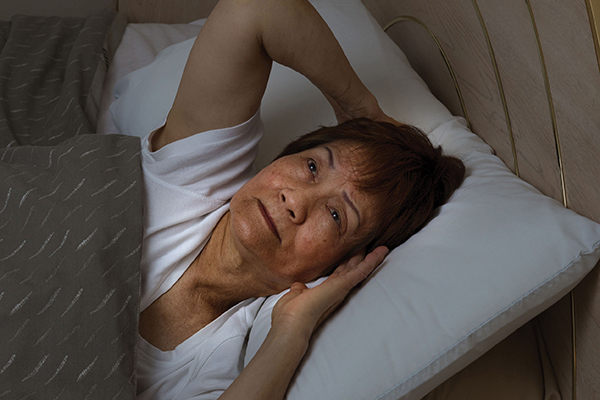Too Many Sleepless Nights?
You can get help for cancer-related insomnia
by Ryan Davidson, PhD and Eric Zhou, PhD
Has this ever happened to you? You get into bed and then all the worries of the day come rushing in, leaving you tossing and turning and unable to fall asleep? Or you wake up in the middle of the night and struggle to fall back asleep? Well, you’re not alone.
While a night or two of poor sleep can happen to anybody, many cancer survivors experience insomnia. Insomnia is a sleep disorder in which a person has difficulty falling asleep or staying asleep. People with insomnia may also wake up too early. The rate of insomnia is much higher in cancer survivors than in the general population. And the condition may persist even after active treatment has ended. In fact, insomnia can continue for years if it is not properly treated.
Most people understand how it feels to have one bad night of sleep. But did you know that chronic sleep difficulties can have a major impact on your health? Chronic sleep problems, like insomnia, can affect your memory and concentration, hinder your ability to manage your emotions, and decrease your immune functioning.
How Cancer and Sleep May Be Linked
There are several explanations for why sleep difficulties are more common in cancer survivors. The emotional distress of being diagnosed with cancer can make it very difficult to fall asleep at night. Moreover, cancer treatments themselves can contribute to sleep difficulties. For example, some side effects of chemotherapy, such as nausea and fatigue, can negatively affect your sleep. For people recovering from surgery, the pain and discomfort caused by surgery can make getting a restful, full night of sleep even more difficult.
While a night or two of poor sleep can happen to anybody, many cancer survivors experience insomnia.
Once you’ve had a night or two of poor sleep, you may start to change your sleep behaviors to try and manage the disruption that it causes in your life. For example, after a bad night of sleep, you might try to limit your activity the next day or take a nap to recover. Or, if you are experiencing anxious thoughts at night, you may try to distract yourself by falling asleep with the TV on. While these strategies might help you cope with feeling tired or stressed in the moment, they may actually cause your sleep problems to persist, or even worsen, in the long run.
What You Can Do to Improve Your Sleep
For many cancer survivors, insomnia treatment involves prescription or over-the-counter medication. However, these are not meant for long-term use, and using them long term can create psychological and physiological dependence on the use of medication for sleep.
The gold standard of insomnia treatment for adults is cognitive behavioral therapy for insomnia, or CBT-I for short. CBT-I is different from cognitive behavioral therapy for other disorders, such as anxiety or depression. CBT-I targets the maladaptive sleep behaviors and thoughts that disrupt good sleep. As part of CBT-I, cancer survivors can expect to track their sleep using sleep logs, develop a consistent sleep “window,” learn to avoid sleep-impairing activities in their bedroom, initiate behaviors that improve sleep, address the thoughts that can make it more difficult to fall asleep or stay asleep, and learn relaxation exercises.
Wake up at the same time every day (yes, seven days a week, even on weekends). Having a consistent wake time is more important than having a consistent bedtime.
If you are concerned about your sleep, you should meet with a sleep specialist for a thorough evaluation. It may be that your sleep difficulties are due to another medical condition or even another sleep disorder, such as obstructive sleep apnea.
Tips for Getting Better Sleep
If you are unable to obtain cognitive behavioral therapy for insomnia, there are some things you can do on your own to improve your sleep. Keep in mind that these tips are not meant to be overnight fixes; they do require consistency on your part for you to see improvements.
• Wake up at the same time every day (yes, seven days a week, even on weekends). Having a consistent wake time is more important than having a consistent bedtime.
• Use the bed only for sleep and sex. Restrict other activities to outside the bed. This includes “trying” to sleep. If you are having trouble falling asleep, get out of bed, and only return when you feel sleepy.
• Create an environment made for sleep. Keeping your room dark at night, quiet, and at a cool yet comfortable temperature helps your body relax in bed.
• Limit naps. If you must nap, keep it to less than 30 minutes and don’t nap within 8 hours of bedtime.
• Limit technology use before bed. That means no cellphones, television, or computer screens before bed – two hours is best. Don’t bring your phone into bed with you. Use a separate alarm clock to wake you up in the morning.
• Pay attention to your daily habits. Avoid caffeine and alcohol six to eight hours before bed. Exercise regularly, but not right before bed.
• Create a calming, enjoyable bedtime routine. Use the 30 minutes before bed for this routine.
• Talk about your worries or fears during the day, not right before bed.
Remember, using these strategies every day is critical for them to work. If you aren’t consistent, you will just be continuing the disruptive strategies that contributed to your poor sleep in the first place. Implementing these tips can be very difficult in the beginning, and you may even feel sleepier at first. However, over time, these strategies can help improve your sleep and your day-to-day functioning.

Dr. Ryan Davidson is a Postdoctoral Fellow at Boston Children’s Hospital in Boston, MA.
Dr. Eric Zhou is on faculty at Harvard Medical School and is a staff psychologist at the Dana-Farber Cancer Institute in Boston, MA.

If you are struggling with significant sleep difficulties that are interfering with your daily functioning, we recommend following up with a CBT-I provider. If there is not a provider near you, contact a healthcare provider who can recommend other options for you.
This article was published in Coping® with Cancer magazine, September/October 2018.


